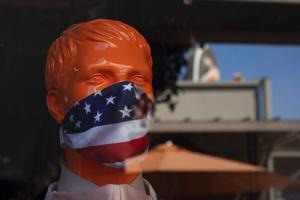 A mannequin wears a face mask at the Citadel Outlets in Commerce, Calif., July 2, 2020. (PHOTO / AP)
A mannequin wears a face mask at the Citadel Outlets in Commerce, Calif., July 2, 2020. (PHOTO / AP)
When Donalene Ferrer, an Asian-American nurse in San Diego, California, walked with her daughter and mother in their neighborhood, a car drove by and the couple inside it yelled: "You started the corona!" They continued yelling obscenities after they parked in front of a house only three doors from Ferrer's mother's.
"It was pretty disheartening. I cried when the commander-in-chief, or whatever you want to call him, said 'China virus' and 'kung flu'. I kind of knew something was happening," said Ferrer, while recounting her encounter that happened three months ago.
Critics said the harassment against Asian Americans has been further stoked by US President Donald Trump's repeated use of the terms like "Chinese virus" and "kung flu" in his recent rallies and Twitter posts to scapegoat China for his handling of the pandemic
Her experience was one of the more than 800 incidents that took place in California and were self-reported on Stop AAPI Hate, a website that tracks coronavirus-related racist acts, over the past three months.
Averaging 10 cases per day, these reports reveal a consistent, pervasive pattern of anti-Asian-American hate throughout California, and they also indicate that "the racist rhetoric coming from the highest office in the land is creating a dangerous environment for Asian Americans", said Cynthia Choi, co-executive director of Chinese for Affirmative Action, at a webinar on Wednesday.
Those incidents, including verbal harassment and physical assault, are happening at workplaces, in retail and online, permeating all aspects of daily life, said Choi.
READ MORE: Sub-Saharan Africa set for deeper pain from virus, IMF warns
"These two white ladies were moving toward me, but as they passed by me and said:'Go back to China with your dirty diseases'," a respondent in Verdugo City, California, was cited as saying in the report released by Stop AAPI Hate on Wednesday.
"Someone threw a glass bottle at my friend while she was putting her baby in the car and yelled, 'Go home, chink'," said another respondent in San Francisco.
Critics said the harassment against Asian Americans has been further stoked by US President Donald Trump's repeated use of the terms like "Chinese virus" and "kung flu" in his recent rallies and Twitter posts to scapegoat China for his handling of the pandemic.
"The connection between anti-China rhetoric and the anti-Asian hate has been confirmed by the data we've collected through our reporting center," said Choi.
Nationwide, the Stop AAPI Hate site has received more than 2,000 reports of discrimination against Asian Americans since the early stages of the coronavirus pandemic in March. Of those incidents, more than 500 were reported to involve the use of the terms "China" or "Chinese".
"Our reports reveal that consistent parroting of Trump's language-how animus is tied to beliefs about Chinese and the source of the spread of the coronavirus, and pervasive use of Orientalist stereotypes about Chinese diet and hygiene," Choi said.
"We condemn the racist, seditious and violent rhetoric coming from the president and political leaders at the very top, who racialize tragedies to score political points and distract from their own mishandling of the pandemic."
ALSO READ: Virus fears grow for isolated indigenous people in Brazil's Amazon
Main themes
Nationwide, the Stop AAPI Hate site has received more than 2,000 reports of discrimination against Asian Americans since the early stages of the coronavirus pandemic in March
Mae Ngai, professor of history at Columbia University, noted that during the pandemic, there were instances of harassment and some violence against Chinese in the United Kingdom but it didn't continue for long.
Part of the reason that nativism in the UK and on the European continent didn't have the same kind of traction as it has in the US is the political leadership in those countries opposed racism and didn't encourage it as Trump and his Republican allies did in the US, said Ngai.
"In the United States, the president led the racist attacks against Chinese and China. This is no surprise to us since racism and nativism have been the main themes of his administration, and indeed his entire political career," she said.
California Assembly Member David Chiu echoed her comments, saying there's also a "pandemic of racism being perpetrated by the commander-in-chief of the US".
Choi also pointed out that Trump's words alone aren't the problem, but an entire policy agenda that's built on punishing immigrants and protecting white supremacy.
"In addition to unrelenting attacks on those who are undocumented, these anti immigrant policies include bans and restrictions on asylum-seekers, Chinese students, high-skilled workers, green card holders and so many others," she said.


